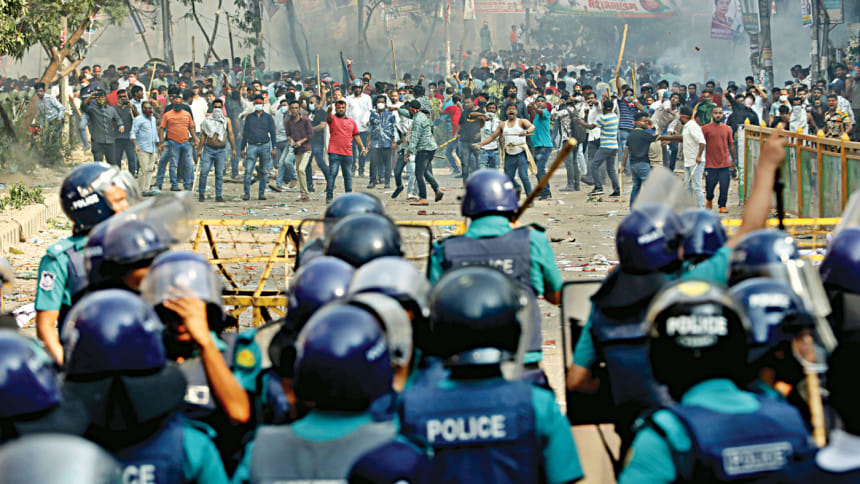Unrest bearing on fragile economy

The political unrest and the garment workers' agitation in the apparel sector have started to take a toll on the economy that is already grappling with elevated inflation, a depleting dollar stockpile, slowing exports and decelerating private sector activities.
Both passenger and cargo traffic on the roads inside the cities and highways has drastically reduced for fear of getting caught up in clashes.
The seaports, which handle 90 percent of Bangladesh's $130 billion international trade, have registered a decline in cargoes as businesses preferred not to transport goods -- be that industrial raw materials or consumer goods -- during blockades to avoid any risk of damage.
It is the same in the case of transportation of consumer goods from factories to markets across the country and farm produce to cities and towns.
"Even by offering a higher fare, we are not getting trucks -- so many vegetables are rotting in the fields," said Mohammad Habib, a wholesale vegetable seller in the capital's Kawran Bazar.
In normal times, the transport cost from Panchagarh to Dhaka is Tk 22,000. Habib offered more than Tk 40,000 but found no vehicle to ferry the produce to the capital.
He cited the case of a farmer in Panchagarh who offered a maund of bitter gourd for Tk 800, which was Tk 1,500 just a few days back.
Still, the farmer is not finding any buyer, according to Habib.
"Although the economy has been under stress for a year and a half now, things have not spiralled out of control yet. The whole situation is creating uncertainty and grief for the economy."
"Farmers are not able to sell their produce, and people in Dhaka are paying a high price for those," he added.
A top official of a leading fast-moving consumer goods company with more than Tk 800 crore in annual turnover said they are struggling to send merchandise to the rural areas as it is too risky.
"If this continues, the situation will worsen and sales will plummet. All of the FMCG companies are facing the same problem," he said preferring anonymity to speak candidly on the issue.
This disruption in the supply chain will further fuel inflation, which grazed double digits in October, and cause more suffering for low- and middle-income people, said Selim Raihan, executive director of the South Asian Network on Economic Modelling (Sanem).
"Some businessmen also can exploit the situation and raise the prices," he said.
The current situation is impacting the efforts to stabilise the economy, said Raihan, also a professor of economics at the Dhaka University.
Exports, which are already on the slow lane, will be further disrupted, putting more pressure on the strained dollar stockpile.
"Although the economy has been under stress for a year and a half now, things have not spiralled out of control yet. The whole situation is creating uncertainty and troubles for the economy."
The continuation of the political unrest could hit the economy hard.
"Once things go out of control, it will be very tough to reign it in," Raihan added.
Mustafa K Mujeri, a former chief economist of the central bank, said that in every election year, some violence and political uncertainty are seen and the economy could absorb the pressure.
But this time is different.
"Bangladesh's economic problems have turned into a crisis already. And any political unrest may deepen the crisis further …"
The global situation is not favourable either, said Mujeri, a former director general of Bangladesh Institute of Development Studies.
He urged the government to reach a political consensus through effective dialogue.
"Otherwise, it will be difficult to revive the economy after the election," said Mujeri, also an executive director at the Institute for Inclusive Finance and Development.
Faruque Hassan, president of the Bangladesh Garment Manufacturers and Exporters Association, said that if the political unrest continues, it will heavily impact garment exports.
Since the garment sector operates with a tight schedule, blockades or strikes for two to three days throw off the schedule and raise the possibility of missing deadlines.
"It is tough to say how long it will take for us to overcome the situation," said Hassan, also the managing director of Giant Group.
Talking to this newspaper, Fazlul Hoque, a former president of the Bangladesh Knitwear Manufacturers and Exporters Association, said buyers have the option to shift their orders to other countries as the competitor countries have huge capacity.
Amid the political unrest, the garment sector's four million workers went on a protest campaign for 12 days for a minimum wage of at least Tk 20,000. The unrest led to suspension of production in as many as 500 factories.
"The political and labour unrest is creating financial cost and damaging goodwill. It might be very costly for the economy," he added.

 For all latest news, follow The Daily Star's Google News channel.
For all latest news, follow The Daily Star's Google News channel. 








Comments